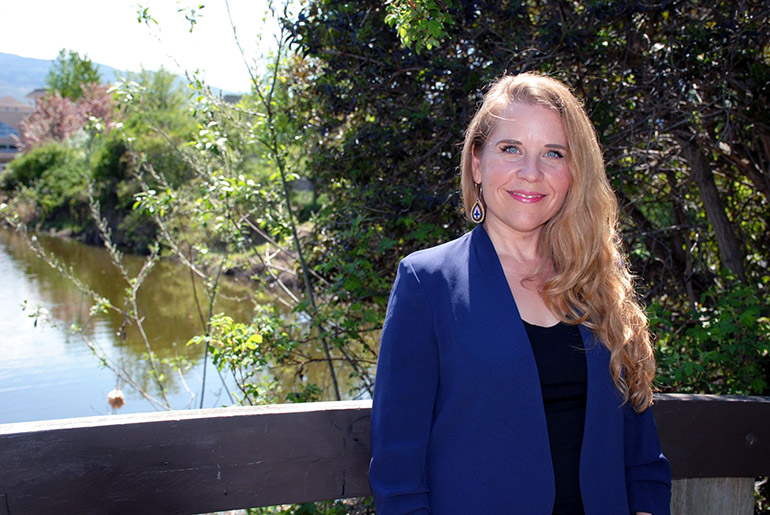
Katrina Plamondon, assistant professor in UBC Okanagan’s School of Nursing.
World trade limitations will impact accessibility of vaccine for millions of people
As the Canadian government plans for a mass inoculation campaign with the soon-to-be available COVID-19 vaccines, a UBC Okanagan researcher, together with more than 100 health researchers across the country, is asking the government to think globally, not locally.
Katrina Plamondon is an assistant professor in UBCO’s School of Nursing. She conducts research on health equity and through her work with the Canadian Coalition for Global Health Research, she joins this collective call for Canada to support a temporary waiver to allow step up of international production of vaccines and other essential health products during the COVID-19 pandemic.
Plamondon explains that intellectual property rights are protected by a World Trade Organization (WTO) agreement. As it stands, she says that the WTO’s Council for Trade-Related Aspects of Intellectual Property Rights (TRIPS) is likely to negatively impact the distribution of vaccines, treatment, equipment, and knowledge to battle the pandemic. There is a global call for a waiver to certain TRIPS rules to ensure developing countries can rapidly scale up access to vaccines, treatments and equipment without fear of a trade dispute.
While the rush to obtain COVID vaccines is important, Plamondon explains how existing trade rules impact the delivery of the vaccine globally.
Why has this become such an important issue?
News of promising vaccines sparked optimism for light at the end of a pandemic tunnel, with some countries far more optimistic than others. TRIPS protects trade-related aspects of patents and copyrights on things like vaccines, medicines, and medical tests. In this pandemic, public dollars have been poured into research and development for vaccines. The TRIPS waiver is important because access vaccine everywhere is determined by accessibility and affordability. Some countries can afford to purchase, others to manufacture—and many cannot. The TRIPS agreement empowers developing countries’ capacity to get vaccine to people who need it.
The TRIPS waiver would let member states bypass time-consuming procedures for issuing or enforcing patents. That would make COVID-19-related products—including vaccines—global public goods, at least for the acute phase of the pandemic.
Explain why this waiver to TRIPS is vital and why the clock is ticking.
The WTO oversees policy and regulations for trade. Intellectual property, just like natural resources, is considered a trading good. Under ‘normal’ globalization conditions, the agreement works to protect the interests of countries and companies that develop intellectual property. During a pandemic crisis, the goals of this trade agreement clash with those of protecting global public health.
This month, the WTO will meet and member states will vote on the waiver which would allow developing countries to scale-up production of essential pandemic supplies and medicines like vaccines, diagnostic tests or personal protective equipment, without the risk of violating trade agreements. It would enable rapid access to essential medicines and supplies to help the world move through this pandemic as quickly as possible.
My colleagues Ron Labonté, an expert in globalization, global trade and health; and Mira Johri, an expert in vaccinations and public health, have written a compelling piece about this with more to come soon.
Who is supporting this waiver? Who isn’t?
99 developing countries already declare support for the waiver. Along with the World Health Organization’s Director-General, the TRIPS waiver is backed by international leaders, developing countries, dozens of health non-governmental organizations and close to one million public health researchers and 400 civil society groups worldwide. I am among the over 100 Canadian health researchers and professionals endorsing an open letter to the Government of Canada.
The waiver is opposed by a handful of wealthier countries—including Canada—that have strong financial interests in protecting current intellectual property regulations. Others against the waiver are the US, the UK, the EU, Norway, Switzerland, Japan and Brazil.
Canada has committed to the global effort to ensure international and fair access to a COVID-19 vaccine. But you stress that more needs to be done?
Yes, in the fall the Government of Canada announced that it would contribute $243 million help purchase vaccines for low-and middle-income countries. This is an excellent start and a generous contribution from Canada. But we need to keep standing for equity and human rights on the global stage. Canada can do more to leverage its influence as a middle power and our voice matters.
This pandemic will not disappear if countries vaccinate their own population, leaving millions of people around the world isolated and without a vaccine. One thing this pandemic has done, is created an opportunity to build international policies and meaningful programs that will ensure a balanced, fair and healthy future for us all. It’s not always easy to see why we should care so much about how other countries are faring. Today, we can create a better, more equitable shared future. To do so, we need to see ourselves as part of a greater global community. I think that’s a legacy that most, if not all Canadians agree on.